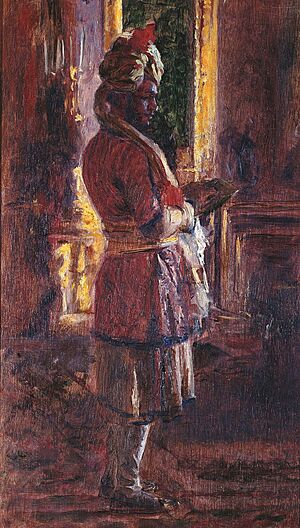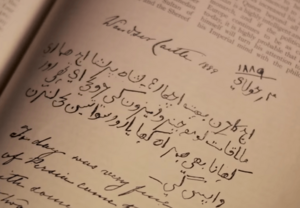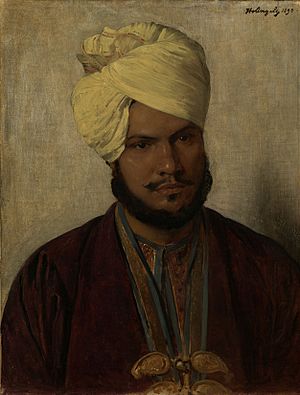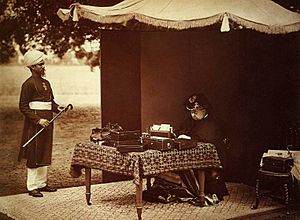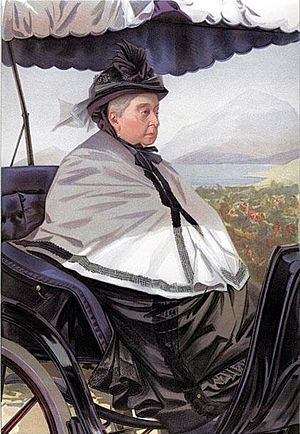Abdul Karim (the Munshi) facts for kids
Quick facts for kids
Munshi Hafiz
Mohammed Abdul Karim
|
|
|---|---|
|
منشى عبدالكريم
|
|
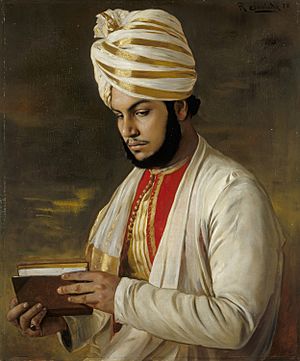
Portrait by Rudolf Swoboda, 1888
|
|
| Indian Secretary to Queen Victoria | |
| In office 1892–1901 |
|
| Personal details | |
| Born | 1863 Lalitpur, North-Western Provinces, British India |
| Died | 20 April 1909 (aged 46) Agra, United Provinces, British India |
| Spouse | Rashidan Karim |
Mohammed Abdul Karim (1863 — 1909), often called "the Munshi", was an Indian man who worked for Queen Victoria. He served the Queen for the last 14 years of her life. During this time, he became a very close friend to her.
Karim was born in Lalitpur, a town in British India. His father worked at a hospital. In 1887, Queen Victoria was celebrating her 50th year as Queen (her Golden Jubilee). Karim was one of two Indian men chosen to work for her. Victoria liked him very much and gave him the special title of "Munshi". This word means "clerk" or "teacher".
The Queen made him her Indian Secretary. She gave him many awards and even arranged for him to receive land in India. Karim's close friendship with the Queen caused problems with other people in the Royal Household. They felt they were better than him. The Queen always wanted Karim to travel with her, which led to arguments with her other staff.
After Queen Victoria died in 1901, her son, Edward VII, sent Karim back to India. Edward also ordered that all letters between Karim and Victoria be taken and destroyed. Karim then lived a quiet life near Agra, on the land Victoria had given him, until he died at age 46.
Contents
Early Life of Abdul Karim
Mohammed Abdul Karim was born in 1863 in a Muslim family. His father, Haji Mohammed Waziruddin, was a hospital assistant. Karim had an older brother and four younger sisters. He learned Persian and Urdu at home. As a teenager, he traveled around North India and into Afghanistan.
After a war, Karim's father moved to a job at the Central Jail in Agra. Karim worked as an "agent" for a local ruler for three years. Then, he moved to Agra and became a clerk at the jail. His father arranged for Karim to marry the sister of a co-worker.
Prisoners at the Agra jail learned to weave carpets as part of their rehabilitation. In 1886, 34 prisoners went to London to show their carpet weaving skills at an exhibition. Karim helped the jail superintendent, John Tyler, choose the carpets and weavers. Queen Victoria visited the exhibition and received a gift of two gold bracelets, which Karim had also helped choose.
The Queen was very interested in India and wanted to hire some Indian servants for her Golden Jubilee. She asked Tyler to find two men to work for her for one year. Karim quickly learned British manners and some English. He was sent to England with another man, Mohammed Buksh. They were meant to start as waiters and learn other tasks.
Becoming a Royal Servant
Karim and Buksh arrived at Windsor Castle in June 1887. They first served Queen Victoria breakfast on June 23, 1887. The Queen wrote in her diary that Karim was "much younger, much lighter, tall, and with a fine serious countenance." She noted that his father was a doctor in Agra.
A few days later, the Queen wrote that "The Indians always wait now and do so, so well and quietly." By August, she was learning a few words of Hindustani to speak to her servants. She found it very interesting.
Victoria quickly grew fond of Karim. She ordered that he receive more English lessons. By February 1888, she noted he had "learnt English wonderfully." Karim told the Queen that he had been a clerk in India, so waiting tables was beneath him. In August 1888, she promoted him to "Munshi". The Queen wrote that she wanted to keep him because he helped her learn Hindustani and was "very intelligent & useful." Karim became the first Indian personal clerk to the Queen.
According to a writer named Sushila Anand, the Queen's letters show that she and the Munshi talked about many things. These included philosophy, politics, and everyday matters. The Queen found in Abdul Karim a connection to a fascinating new world. She also found a trusted friend who would not just tell her what officials wanted her to hear. Karim was put in charge of the other Indian servants and their money. Victoria praised him in her letters, saying, "I am so very fond of him. He is so good & gentle & understanding all I want & is a real comfort to me."
At Balmoral Castle, the Queen's home in Scotland, Karim was given the room that had belonged to John Brown. Brown was another favorite servant of the Queen who had died earlier. The Queen also wrote that Karim was "very friendly and cheerful with the Queen's maids and laughs and even jokes now."
Problems with the Royal Household
In November 1888, Karim went back to India for four months. He wrote to Victoria that his father hoped for a pension (money paid regularly after retirement). The Queen then wrote to the Viceroy of India, Lord Lansdowne, asking him to help Karim's father.
Karim's quick rise in importance made other members of the Royal Household jealous. They usually did not mix with Indians unless they were princes. The Queen expected them to welcome Karim, who was from an ordinary background, but they did not want to. Karim, in turn, expected to be treated as an equal.
When the Queen's son, Albert Edward, hosted a party in 1889, Karim was seated with the servants. Feeling insulted, he went to his room. The Queen sided with Karim, saying he should have sat with the Household. When the Queen attended the Braemar Games in 1890, her son Prince Arthur, Duke of Connaught and Strathearn, was angry to see the Munshi sitting with the upper-class guests.
Victoria refused to believe any bad things said about Karim. She thought concerns about his behavior were "very wrong." In June 1889, Karim's brother-in-law sold one of Victoria's brooches. The Queen accepted Karim's explanation that he had found it, but others thought it was stolen. In July, Karim was given a private sitting room and a better bedroom.
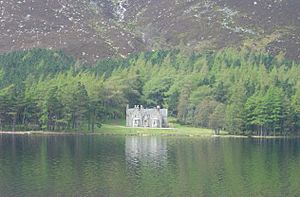
The Queen, influenced by the Munshi, continued to write to Lord Lansdowne about India. She worried that Muslims might not win many seats in new elected councils because they were a minority. She also suggested changing Hindu festival dates so they wouldn't clash with Muslim ones.
In September 1889, during Victoria's stay at Balmoral, she and Karim stayed for one night at a remote house called Glas-allt-Shiel. Victoria had often stayed there with John Brown and had said she would never return after his death. In early 1890, Karim became ill with a painful swelling on his neck. Victoria told her doctor, James Reid, to care for him. She wrote to Reid, saying she felt responsible for her Indian servants because they were far from home.
Land and Family Matters
In 1890, the Queen had Karim's portrait painted by Heinrich von Angeli. The Queen said von Angeli wanted to paint Karim because he had never painted an Indian before and was impressed by his looks. On July 11, she wrote to Lord Lansdowne and the Secretary of State for India, asking for "a grant of land to her really exemplary and excellent young Munshi." The Queen wanted to make sure Karim would be taken care of after she was gone.
Lansdowne replied that land grants were usually only given to soldiers for long, good service. However, he agreed to find land for Karim that would provide about 600 rupees a year. Victoria kept writing to Lansdowne, pushing for the land grant. On October 30, the Munshi left for India for four months. On the same day, Lord Lansdowne told the Queen that land in Agra had been arranged.
In November 1890, Lansdowne met Karim in Agra and arranged for him to sit with important staff during a special meeting. Lansdowne also met Karim's father and, secretly, his wife and mother-in-law, who followed a custom called purdah (where women stay secluded).
In June 1892, Karim's father visited Britain and stayed at Balmoral and Windsor Castles. He retired in 1893 and received the title of Khan Bahadur, which pleased Victoria.
In May 1892, the Munshi went to India for six months. When he returned, his wife and mother-in-law came with him. Both women were completely covered and traveled in train compartments with closed curtains. Victoria wrote that they were "the first Mohammedan purdah ladies who ever came over." As a woman, Victoria was allowed to see them without their veils. The Munshi and his family stayed in cottages at Windsor, Balmoral, and Osborne. Victoria often visited them, bringing her female guests, including the Empress of Russia.
In 1892, the Munshi's name started appearing in official court announcements. This showed he was important enough to accompany the Queen on her trips. In 1893, he was introduced to King Umberto I of Italy. People in Italy thought he was a captive Indian prince, which showed how important he seemed.
By 1893, Victoria was sending notes to Karim signed in Urdu. She often signed her letters to him as "your affectionate mother, VRI" or "your truly devoted and fond loving mother, VRI."
Travels and Diamond Jubilee
Many people felt the Munshi took advantage of his special position with the Queen. He seemed to rise above his place as a clerk, which caused anger in the court. During a trip to Italy, he placed an advertisement saying he belonged to "a good and highly respectful famiely." Karim refused to travel with other Indian servants and took the maid's bathroom for himself.
When he visited Coburg, he refused to attend the wedding of Victoria's granddaughter. This was because her father, Victoria's son, gave him a seat in the gallery with the servants. Faced with opposition from her family, the Queen defended Karim. She wrote that to say the "poor good Munshi is so low is really outrageous." She pointed out that she knew archbishops who were sons of a butcher and a grocer. She said Karim's father was a good doctor, and Karim felt hurt by how he was spoken of.
Lord Lansdowne's time as Viceroy ended in 1894. He was replaced by Lord Elgin. Victoria asked Frederick Ponsonby, Elgin's assistant, to visit Karim's father in Agra. Frederick told Victoria that Karim's father was "only the apothecary at the jail," not a "surgeon-general." Victoria strongly denied this and was angry. She did not invite Frederick to dinner for a year.
At Christmas 1894, the Munshi sent Lord Elgin a greeting card, which Elgin did not acknowledge. Victoria was upset by this. Frederick Ponsonby wrote that Karim was very unpopular in the Household, much like John Brown had been. Princesses Louise and Beatrice, Prince Henry of Battenberg, and other important people had all complained about Karim to the Queen. But she "refused to listen" and became "very angry."
Victoria's advisors worried that Karim was connected to Rafiuddin Ahmed, an Indian political activist in London. They thought Ahmed might get secret information from Karim to give to the leader of Afghanistan. However, there is no proof that Karim ever shared secrets.
In March 1895, during the Queen's holiday in France, local newspapers wrote articles about "Le Munchy," calling him the "Indian secretary" and "the Queen's professor." In May 1895, Karim was given the award of Companion of the Order of the Indian Empire (CIE), even though some officials were against it.
In early 1896, Karim went back to India for six months. Officials watched him secretly, but his visit home seemed to be uneventful. He returned to Britain in August 1896 with his young nephew. Karim had no children of his own.
In March 1897, members of the Household insisted that Karim not join the royal party for the Queen's annual trip. They threatened to resign if he did. When the Queen was told of this, she became very angry. The Household eventually gave in, but the holiday was difficult due to arguments. Victoria believed their dislike of Karim was due to "race prejudice" and jealousy.
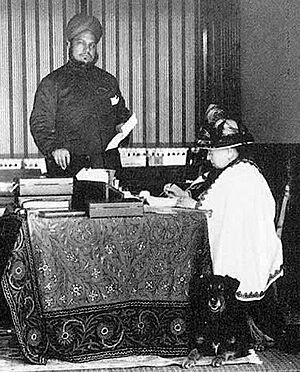
After the troubles of 1897, Victoria tried to comfort the Munshi. She wrote to him that she had made sure he would be financially secure in her will. She told her doctor, James Reid, that the arguments caused stress for her and the Munshi. Reid, however, thought Karim was not stressed, "judging from his robust appearance."
In 1899, the Household again insisted that Karim not go with the Queen on her holiday. The Queen kept Karim at Windsor, but once the party settled in, she wired him to come and join them.
Later Life and Legacy
By late 1898, Karim had bought more land and had become quite wealthy. In 1899, on her 80th birthday, Queen Victoria gave Karim another award, making him a Commander of the Royal Victorian Order (CVO).
The Munshi returned to India in November 1899 for a year. His father died in June 1900. When Karim came back to Britain in November 1900, Victoria was much older and her health was failing. She died within three months.
After Victoria's death, her son, Edward VII, sent the Munshi and his family back to India. However, Edward allowed Karim to be the last person to see Victoria's body before her coffin was closed. Karim also took part in her funeral procession. Almost all the letters between Victoria and Karim were burned on Edward's orders.
In 1905–06, George, Prince of Wales, visited India. He wrote to his father, King Edward, from Agra, saying, "In the evening we saw the Munshi. He has not grown more beautiful and is getting fat. I must say he was most civil and humble and really pleased to see us."
The Munshi died at his home in Agra on April 20, 1909, at age 46. He was buried in a special tomb next to his father.
After his death, King Edward VII ordered that any remaining letters between the Munshi and the Queen be taken. Karim's family, who later moved to Pakistan, kept his diary and some letters hidden until 2010, when they were made public.
Legacy
Since the Munshi had no children, his nephews and grandnephews inherited his wealth and properties. His family lived in Agra until India became independent in 1947. Then, they moved to Karachi, Pakistan. The Indian government took over Karim's estate and gave it to refugees.
For a long time, not much was known about the Munshi. But in the 1960s, historians started studying his life. They looked at how his story showed problems with race and class in Victorian England. Many historians agree that the dislike for Karim was based on snobbery and prejudice against his background and skin color.
Historians also agree that the Munshi influenced the Queen's ideas about India, making her favor Muslims over Hindus. However, they do not believe he passed any secrets to political activists. Victoria herself said that "no political papers of any kind are ever in the Munshi's hands." She said he only helped her read words she couldn't understand.
The 2017 movie Victoria & Abdul tells a fictional story about the friendship between Abdul Karim and Queen Victoria.
 | John T. Biggers |
 | Thomas Blackshear |
 | Mark Bradford |
 | Beverly Buchanan |


